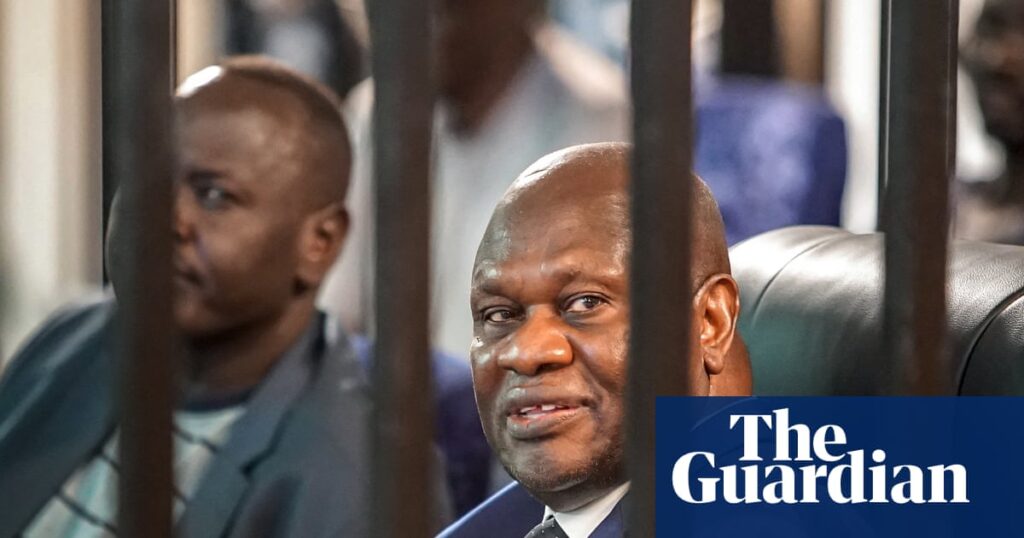South Sudan’s opposition and observers have warned that the prosecution of the country’s suspended vice-president, Riek Machar, risks jeopardising a peace agreement that ended a devastating civil war and plunging the country into full-scale conflict once again.
On 11 September, Machar was charged with murder, treason, crimes against humanity and other serious crimes in connection with a deadly attack by the White Army rebel group on a government army garrison in Nasir county in the country’s north-east. President Salva Kiir then suspended him from his post.
The prosecution is the culmination of a series of developments this year triggered by the Nasir ambush that has escalated a longstanding feud between Kiir and Machar and raised concern for the fragile peace in the country.
In March, the White Army, a group of community militias that fought alongside Machar’s opposition forces during the civil war, overran a base in the county belonging to the country’s military, the South Sudan People’s Defence Forces (SSPDF). The militia said it had acted in self-defence.
A UN crew member and at least 27 SSPDF soldiers were killed in gunfire a few days later, as a UN helicopter tried to evacuate troops from the county in Upper Nile state.
The government responded by carrying out aerial bombardments in Nasir and neighbouring areas, killing and injuring civilians. Human Rights Watch accused the military of using incendiary weapons.
Authorities also arrested more than 22 political and military personnel aligned with Machar’s party, the Sudan People’s Liberation Army-in-Opposition (SPLM-IO), and put him and his wife, Angela Teny, under house arrest. He was accused of trying to stir up rebellion.
Kiir also reshuffled his cabinet and security personnel in the transitional government, which was created by the peace agreement, including by removing officials aligned to Machar.
In May, he promoted second vice-president Benjamin Bol Mel, a US-sanctioned businessman who is part of his inner circle, as his party’s deputy chairperson, raising fears in the opposition that Kiir was grooming him as his successor.
The latest twist of charging Machar has further inflamed tensions.
“Within a very short period of time, I think I will be in the bushes of South Sudan because this is what the regime has forced us to do,” Pal Mai Deng, SPLM-IO spokesperson and one of 20 people charged alongside Machar, said from self-exile. “Technically speaking, the peace agreement is very much abrogated by the president and his tribal court. No one is left with the room to say that the agreement is still holding.”
Daniel Akech, a senior analyst for South Sudan at the International Crisis Group, described the prosecution as “the last spike in escalations”. “This is actually a big escalation in dismantling the agreement, but not only that – putting Machar behind bars in court is creating emotional tensions, and it’s dividing the country,” he said.
Machar and Kiir were both members of the Sudanese People’s Liberation Army guerilla movement that fought for independence from Sudan, which it gained in 2011, with Kiir becoming president and Machar first vice-president.
South Sudan descended into a bloody civil war in 2013 after Kiir fired Machar and later accused him and others of planning a coup. Machar founded a rebel faction, SPLM-IO, and both groups engaged in fighting that killed more than 400,000 people and displaced nearly half the country’s population. The conflict was marked by reports of ethnic cleansing, sexual violence and conscription of children.
It exposed ethnic tensions in the country and was largely fought along ethnic lines – with most of the fighting occurring between Kiir’s majority Dinka community and Machar’s Nuer, the second-largest ethnic group in the country.
In 2018, Kiir and Machar signed a peace deal brokered by Uganda and Sudan, ending the civil war; creating a unity government of the two parties; and returning Machar to the vice-presidency. But implementation of the agreement has barely taken off, as the two parties constantly collide over power-sharing.
Selam Demissie, researcher at the Institute for Security Studies, said the risk of a return to civil war was “huge”.
“In South Sudan, the one document that’s holding the country together is that 2018 peace agreement,” she said. “Anything that’s done outside of the agreement or the consent of these opposing parties can amount to violation of this peace agreement.”
She said the moves also risk sending a message to other opposition parties – which also have aligned militias – that they may also be under threat.
The Guardian has approached the government spokesperson for comment.
The fighting between militia and government forces that started early this year in Upper Nile has continued and spilled over to five other states where there have been pockets of fighting. Nearly 2,000 people have been killed.
About 300,000 South Sudanese have fled the country so far this year, largely due to escalating conflict, the UN Commission on Human Rights said on Monday. “Armed clashes are occurring on a scale not seen since a cessation of hostilities was signed in 2017, with civilians bearing the brunt of human rights violations and displacements,” the UN said in a statement.
The fighting has also hindered access for humanitarian assistance. “The situation is alarming and there’s a lot of suffering,” said John Garang Akot, head of programme implementation at Plan International South Sudan. “We call on the warring parties to reach an agreement so that the affected communities can enjoy peace.”
Last month, the UN high commissioner for human rights Volker Türk warned the country was on the brink of renewed war and urged the government to ensure due process and a fair trial for Machar and his co-accused.
Deng, who was dismissed as water resources and irrigation minister in August, called on regional and international communities to intervene “to save the country from descending into another chaos and political disorder”.
“Everyone in the country is tired of war,” he said. “In the last years of wars that we have fought, none of us has benefited. No one has won.”

